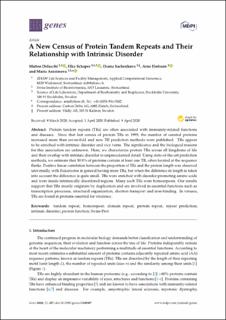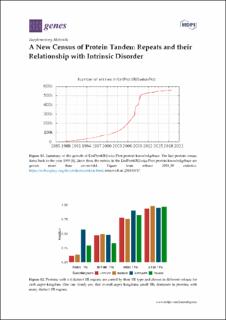Please use this identifier to cite or link to this item:
https://doi.org/10.21256/zhaw-19977| Publication type: | Article in scientific journal |
| Type of review: | Open peer review |
| Title: | A new census of protein tandem repeats and their relationship with intrinsic disorder |
| Authors: | Delucchi, Matteo Schaper, Elke Sachenkova, Oxana Elofsson, Arne Anisimova, Maria |
| et. al: | No |
| DOI: | 10.3390/genes11040407 10.21256/zhaw-19977 |
| Published in: | Genes |
| Volume(Issue): | 11 |
| Issue: | 4 |
| Page(s): | 407 |
| Issue Date: | 9-Apr-2020 |
| Publisher / Ed. Institution: | MDPI |
| ISSN: | 2073-4425 |
| Language: | English |
| Subjects: | Swiss-Prot; Domain repeat; Homorepeat; Intrinsic disorder; Protein function; Protein repeat; Repeat prediction; Tandem repeat |
| Subject (DDC): | 572: Biochemistry |
| Abstract: | Protein tandem repeats (TRs) are often associated with immunity-related functions and diseases. Since that last census of protein TRs in 1999, the number of curated proteins increased more than seven-fold and new TR prediction methods were published. TRs appear to be enriched with intrinsic disorder and vice versa. The significance and the biological reasons for this association are unknown. Here, we characterize protein TRs across all kingdoms of life and their overlap with intrinsic disorder in unprecedented detail. Using state-of-the-art prediction methods, we estimate that 50.9% of proteins contain at least one TR, often located at the sequence flanks. Positive linear correlation between the proportion of TRs and the protein length was observed universally, with Eukaryotes in general having more TRs, but when the difference in length is taken into account the difference is quite small. TRs were enriched with disorder-promoting amino acids and were inside intrinsically disordered regions. Many such TRs were homorepeats. Our results support that TRs mostly originate by duplication and are involved in essential functions such as transcription processes, structural organization, electron transport and iron-binding. In viruses, TRs are found in proteins essential for virulence. |
| URI: | https://digitalcollection.zhaw.ch/handle/11475/19977 |
| Fulltext version: | Published version |
| License (according to publishing contract): | CC BY 4.0: Attribution 4.0 International |
| Departement: | Life Sciences and Facility Management |
| Organisational Unit: | Institute of Computational Life Sciences (ICLS) |
| Published as part of the ZHAW project: | EU MSCA REFRACT: Repeat protein Function, Refinement, Annotation and Classification of Topologies |
| Appears in collections: | Publikationen Life Sciences und Facility Management |
Files in This Item:
| File | Description | Size | Format | |
|---|---|---|---|---|
| 2020_Delucchi_etal_New-census-of-protein-tandem-repeats_Genes.pdf | Publikation | 3.31 MB | Adobe PDF |  View/Open |
| 2020_Delucchi_etal_New-census_Supplementary_Genes.pdf | Supplement | 7.77 MB | Adobe PDF |  View/Open |
Show full item record
Delucchi, M., Schaper, E., Sachenkova, O., Elofsson, A., & Anisimova, M. (2020). A new census of protein tandem repeats and their relationship with intrinsic disorder. Genes, 11(4), 407. https://doi.org/10.3390/genes11040407
Delucchi, M. et al. (2020) ‘A new census of protein tandem repeats and their relationship with intrinsic disorder’, Genes, 11(4), p. 407. Available at: https://doi.org/10.3390/genes11040407.
M. Delucchi, E. Schaper, O. Sachenkova, A. Elofsson, and M. Anisimova, “A new census of protein tandem repeats and their relationship with intrinsic disorder,” Genes, vol. 11, no. 4, p. 407, Apr. 2020, doi: 10.3390/genes11040407.
DELUCCHI, Matteo, Elke SCHAPER, Oxana SACHENKOVA, Arne ELOFSSON und Maria ANISIMOVA, 2020. A new census of protein tandem repeats and their relationship with intrinsic disorder. Genes. 9 April 2020. Bd. 11, Nr. 4, S. 407. DOI 10.3390/genes11040407
Delucchi, Matteo, Elke Schaper, Oxana Sachenkova, Arne Elofsson, and Maria Anisimova. 2020. “A New Census of Protein Tandem Repeats and Their Relationship with Intrinsic Disorder.” Genes 11 (4): 407. https://doi.org/10.3390/genes11040407.
Delucchi, Matteo, et al. “A New Census of Protein Tandem Repeats and Their Relationship with Intrinsic Disorder.” Genes, vol. 11, no. 4, Apr. 2020, p. 407, https://doi.org/10.3390/genes11040407.
Items in DSpace are protected by copyright, with all rights reserved, unless otherwise indicated.